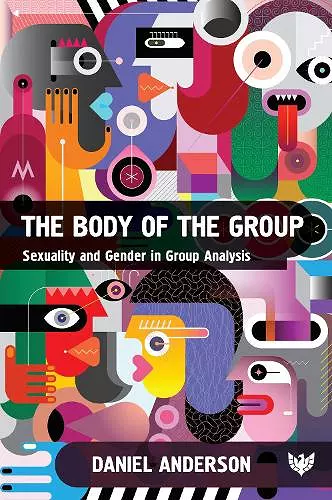The Body of the Group
Sexuality and Gender in Group Analysis
Format:Paperback
Publisher:Karnac Books
Published:9th Sep '21
Should be back in stock very soon

The Body in the Group has been structured around the formation of a group analytic concept of sexuality, using the archaeology of Michel Foucault to move away from psychoanalytic theory, with its association to heteronormativity and pathology, on which group analysis has historically relied. The failure of group analysis to have its own theory of sexuality is, in fact, its greatest potential. It is a psychosocial theory that is able to contain failure in language and gaps in discourse, and, furthermore, can mobilise its creative potential in relation to the discourse of sexuality. Furthermore, using queer theory enables the failure of the term ‘homosexual’ by disrupting its association to heteronormativity and psychopathology that traditional psychoanalysis has emphasised.
The potential of the group analytic matrix to disrupt and change discourse by conceiving of it using figurations and their associated political radicalism within language and discourse permits a radical conception of space and time. Bi-logic removes the potentially unhelpful competitive splits in power associated with the politics of sexuality and gender and, by doing so, enables multiple and contradictory positions of sexuality and gender to be held simultaneously. In addition, group analysis radically alters typical notions of ethics by being able to conceive of a psychosocial form of ethics. Likewise, queer theory raises an awareness for group analysis of the potential violence of its textual representation. Finally, analytic groups are ‘figurations in action’ when terms such as group polyphony, embodiment, discursive gaps, and norms (or no-norms) are mobilised alongside spatio-temporality and bi-logic. The group analytic literature so far has delimited sexuality and gender by over-reliance on psychoanalysis. Daniel Anderson, by utilising group analytic theory alongside the archaeology of Foucault and feminist, queer and education theory, has created an exciting and innovative way of working with sexuality in a group analysis setting.
'If it takes courage and clarity for an individual to know their shadows and to embrace change, this is equally true for organisations, like psychotherapy institutions. Daniel Anderson’s book, written with courage and clarity, beautifully deconstructs many of the assumptions and (dubious) comforts of our historical orthodoxies as group analysts. In the words of gay pioneer Harvey Milk, "once you have dialogue starting, you know you can break down prejudice".'
-- Martin Weegmann, psychologist, group analyst and author‘This is a well-written, well-informed and well-argued academic book providing the reader with an overview of the fundamentals of queer theory. It then proceeds to thoughtfully integrate this into group analytic theory. I highly recommend it as a textbook for all course modules on gender and sexuality. It should be essential reading for teaching trainees on psychotherapy and group analytic trainings. It would also be highly relevant to those training to work in the field of couple counselling and family therapy and as a reference book for clinical supervisors.’
-- Margaret Smith, group analyst, psychodynamic psychotherapist and former course convenor of the Institute of Group Analysis supervision course‘Here, at last, is a book that successfully puts academic debates about gender and sexuality studies into dialogue with group analytic theory and practice. In The Body of the Group, Daniel Anderson meticulously maps the “field imaginary of group analysis” – from the historical parameters of its therapeutic project to the current protocols of its knowledge production. Using historical and contemporary case studies, this new study brings to light the blind spots as well as the remarkable achievements of group analysis. Drawing on his own professional training and experiences, the author offers a fascinating route through how and why group analysis has – and importantly has not – addressed questions of gender and sexuality. Putting feminist and queer studies into dialogue with debates in group analysis, this book urges us to explore what might happen if we were to hold these diverse fields within the same frame.’
-- Jackie Stacey, Professor of Media and Cultural Studies and Director of the Centre for the Study of Sexuality and Culture, The University of Manchester‘Daniel Anderson has started a much needed conversation around sexuality and gender. I have witnessed his bravery, vulnerability and questioning of himself and others to explore their own shadows in our training together. He has respectfully challenged the complacency we all, including institutions, fall into. We all need to take responsibility for addressing the gaps we have in analytic training around difference, in particular, around sexuality and gender. Our training as therapists centres around language and putting words to often very difficult and sensitive situations, yet we have struggled to challenge traditional thoughts around what is normative and we continue to normalise dated and dangerous language around sexuality. It was a privilege to have trained alongside Dan, he continues to push me to be better. This book evidences he has much more to contribute to the development of analytical training.’
-- Baljit Kaur, group analyst and social woISBN: 9781912691906
Dimensions: 229mm x 152mm x 13mm
Weight: 404g
234 pages